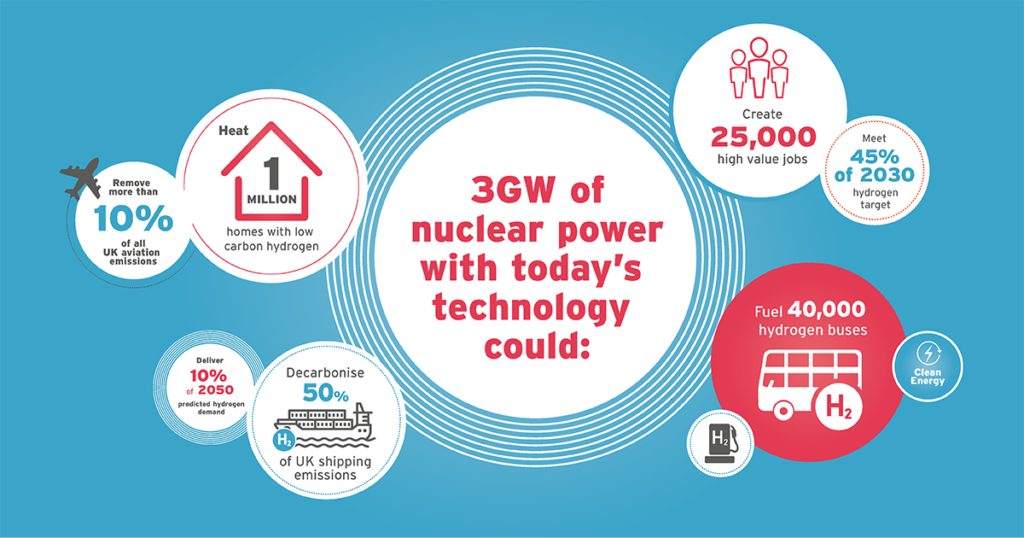Wednesday 14 July 2021
New report sets out cross-sector plan for zero carbon hydrogen from nuclear
Launched by the Nuclear Sector Deal’s Innovation Group, the report maps the actions needed to realise the opportunity of nuclear derived hydrogen to help unlock net zero.
Its findings follow a significant Nuclear Hydrogen Roundtable event, which brought together over 80 experts and industry leaders from across the hydrogen value chain.
A new report has today been launched by the Nuclear Sector Deal’s Innovation Group, setting out a series of urgent and important recommendations for realising the opportunity of zero carbon hydrogen from nuclear.

The report, ‘Unlocking the UK’s Nuclear Hydrogen Economy to Support Net Zero’, is a cross-sector action plan for consideration by the Nuclear Industry Council. Its findings follow a significant Nuclear Hydrogen Roundtable event in May 2021, which brought together over 80 experts and industry leaders from across the hydrogen value chain.
You can download a copy of the report using this link.
Timed to offer maximum value ahead of the UK Government’s anticipated Hydrogen Strategy, the report stresses the scale of the challenge ahead for deep decarbonisation yet the enormity of what nuclear derived hydrogen could deliver. It sets out ten actions for industry and ten commitments for government which, taken now, will help the UK secure net zero carbon emissions on time and on budget.
In a foreword to the report, Dr Fiona Rayment, Chair of the Innovation Group, summarises the key findings of the Nuclear Hydrogen Roundtable as follows:
- Nuclear derived hydrogen can be a low-risk route to hydrogen production, both today and in the future.
- Through a cross-sector approach, significant quantities of nuclear derived hydrogen could be produced at scale to fully support the challenging energy transition.
- A first use case applied now will contribute to meeting today’s policy requirements and demonstrate the entire value chain from production to user.
The action plan establishes the pathway for achieving this with consideration of the necessary economic, technical, regulatory, policy and financial drivers. Its successful delivery would mean not only maximising already commercialised technology, capable of being deployed now, but also driving innovation in technologies which offer further efficiencies and value for money.
Describing the significance of the timing of the report, and the opportunity for the UK to become a global leader in zero carbon hydrogen from nuclear, Dr Fiona Rayment said:
“With decades of nuclear experience, the UK sits on a wealth of skills, talent and capability that can deliver nuclear derived hydrogen at scale. This capability can create the world’s first nuclear derived hydrogen economy, delivering net zero at lower cost to consumers. The UK could spur a future global commodity market for hydrogen, enhancing exports of skills and innovative technology.
“I very much hope and expect that, given its scope and timing, this document will be seen as a turning point for the role of nuclear in the future hydrogen economy and a call to action for the sector to take this one-time opportunity and grab it with both hands. This is an opportunity that can be realised only with true cross-sector collaboration.”
Commenting on the report launch, Tom Greatrex, Chief Executive of the Nuclear Industry Association, added:
“Nuclear power should be right at the heart of zero carbon hydrogen production, alongside renewable technology. Nuclear reactors, both large and small, offer the innovative solutions we need to decarbonise sectors beyond electricity as part of a robust net zero mix, starting today and going into the future. The government has already recognised that potential, and we look forward to working with them and other partners to create a strong framework for a nuclear derived hydrogen economy. It is an opportunity that cannot be missed.”
